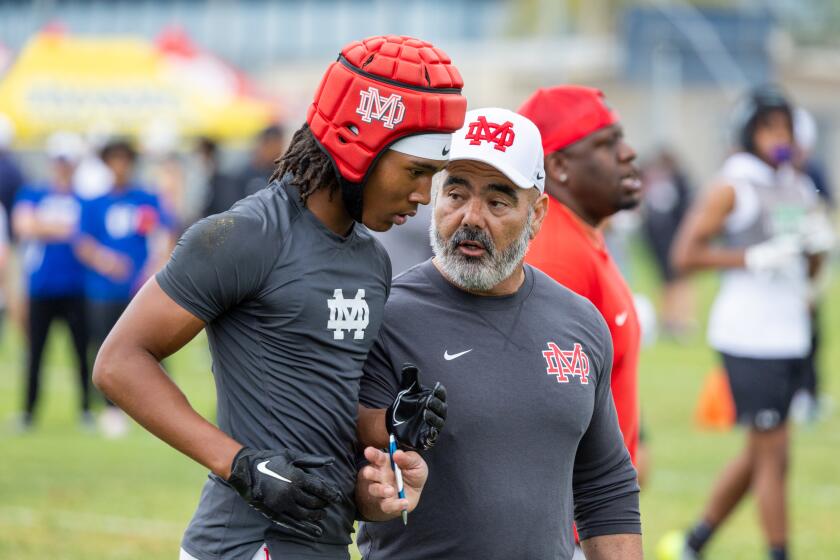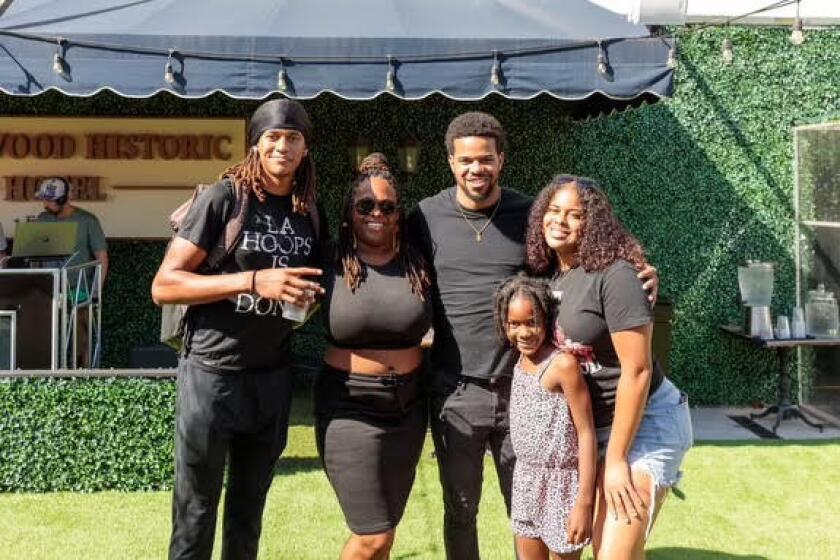Santiago Player Creates Her Own Sense of History
In the days before Title IX, Julie Madison’s athletic horizons might have extended no further than a pompon in either hand.
In the days of Frankie Avalon movies, she would have been considered classic cheerleader material--a spunky, 5-foot blonde with a cute, chipmunk-like smile and a funny, hoarse voice.
But in 1985, as a 14-year-old freshman weighing barely 100 pounds, Julie Madison earned a varsity letter on the Santiago High School soccer team. Before Madison, the school’s only soccer team was for boys.
Madison is the first girl in school history to letter in soccer.
Ten years ago, an athletic pioneer such as Madison might have taken offense at such terms as “letterman.”
But Madison, who was 5 when Title IX was implemented, usually prefers to skirt philosophical battles. Her feet are capable of bouncing a soccer ball 75 times without allowing it to touch the ground, and she generally lets them do the talking.
When asked her opinion about the federal law that allowed girls and women the same athletic opportunities as boys and men, Madison, a bit embarrassed, said: “What’s that? I didn’t even know about that.”
In 1975, when legislation was going into effect that would someday enrich her life, Madison was spending much of her time roller skating on the driveway of her parents’ Garden Grove home.
She starred for six years on girls’ youth soccer teams, but when she reached high school, she faced a dilemma: Quit her sport or try to integrate the boys’ team.
So, along with her older sister and two other girls, she crashed the first team meeting held by the school’s new soccer coach, Miguel Vivanco.
Principal Ray Arroyo said Vivanco’s goal was to attract a “broader cross-section” of students than had previously joined the team, which had never had a winning season.
But did the cross-section intend to include girls ? The unspoken assumption always had been that female soccer players should join the Cavalier field hockey team, one of the county’s best.
But field hockey wasn’t soccer, and Madison, whose dominant left foot already had tallied thousands of points, was not interested in learning to swing a stick.
She remembers the first high school soccer meeting as “scary.”
Many of the boys in the room were laughing and making comments in their native Spanish or Vietnamese.
“Mr. Vivanco said (something) like, ‘You guys can’t play on this team,’ ” Madison recalled. “But the principal happened to be right there and he said, ‘Go ahead, since there’s no girls’ team.’ ”
Arroyo was familiar with the implications of Title IX.
His campus already had a co-ed badminton team and intramural co-ed teams in volleyball and softball. In fact, he had once allowed a girl to try out for baseball, though she was cut.
Arroyo said: “You ask how an administrator makes this decision. Title IX prepares you for it. . . . I believed she should have the opportunity to try out for the team and be judged according to her ability.”
Did he really think she had a chance to play?
“Well, her size and the fact that she was a young lady made it difficult to imagine that she would make the team,” he admitted. “She was a surprise.”
One person who was not surprised when Vivanco decided that Madison belonged on the varsity was her youth soccer coach, Dennis Madison, who doubles as her father.
He describes Madison as “a wildcat” and “a natural” on the soccer field. “She has that killer instinct for scoring,” he said.
Her mother has not been surprised at their middle child’s athletic ability since her first game in third grade.
“Dennis came home and I said, ‘How did she do?” said Anne Madison. “He said she had scored five goals.”
If her high school teammates were skeptical at first, that didn’t last long, either. The other girls made the junior varsity, but Madison made the varsity because her skills were better than those of most boys her age.
“They were messing around and kidding me a lot at first, but by the end of the year, I was just another player,” she said.
This season, Vivanco had a much more talented varsity. So far the team is 6-1. He offered Madison the choice of playing a few minutes per game on varsity again, or becoming the junior varsity’s starting left wing. She decided to play on the JV team.
She and freshman Julie Polman both start for the team, which is 4-3. Teammate Korina Schroeder is a substitute.
“Julie has one of the strongest feet on the team,” said Kevin Peterson, junior varsity coach. “She rockets the ball.
“There aren’t many players with her skills on this level. If it weren’t for her size, she probably would be on varsity again this year.
“She surprises a lot of people. They see this little, cute girl running down the field and then she’ll take a shot and everyone will go, ‘ That came from her ?’ Even the other team starts cheering for her.”
An aggressive player, Madison said she is not intimidated by the hard-hitting nature of boys’ soccer. “I fall a lot,” she explains off-handedly.
What has bothered her?
“It wasn’t the bumping and pushing and stuff,” she said. “That happens in the girls’ games, too. I don’t mind it.
“It was more the feeling that when I mess up, people might say, ‘What’s she doing out there in the first place?’ That hurt the most.”
Dennis Madison sometimes heard those reactions from spectators.
“I’d hear people say, ‘She doesn’t belong out there,’ and I’d just shine it on,” he said. “When she gets the ball and takes a couple shots, you don’t hear them saying it anymore.”
Anne Madison once heard opposing fans hollering for their team to break her daughter’s leg. Julie shrugs. She says the line she hears the most is: “Get her phone number!”
“I just laugh,” she said. Her tolerance of other people’s attitudes reflects an easy-going personality more than the politics of a 15-year-old soccer player.
She said she believes she is a feminist.
“I think women can do anything men can do at any time,” she said. “Sometimes it may take more (effort) for a lady than a man, but we can do it. It all turns out equal.”
In her experience, it hasn’t always been quite as easy as a nod from the principal makes it sound.
“It takes a lot for me to go out there,” she said. “It’s hard.” But every so often, she sees signs of progress.
“The thing I liked the best was there is this day when you can give out flowers at school,” she said. “Everybody orders carnations and I got two from guys on the soccer team.
“It was not that I got flowers. I felt better because I knew everyone wasn’t thinking, ‘Why is she on the team?’ ”
Get our high school sports newsletter
Prep Rally is devoted to the SoCal high school sports experience, bringing you scores, stories and a behind-the-scenes look at what makes prep sports so popular.
You may occasionally receive promotional content from the Los Angeles Times.



